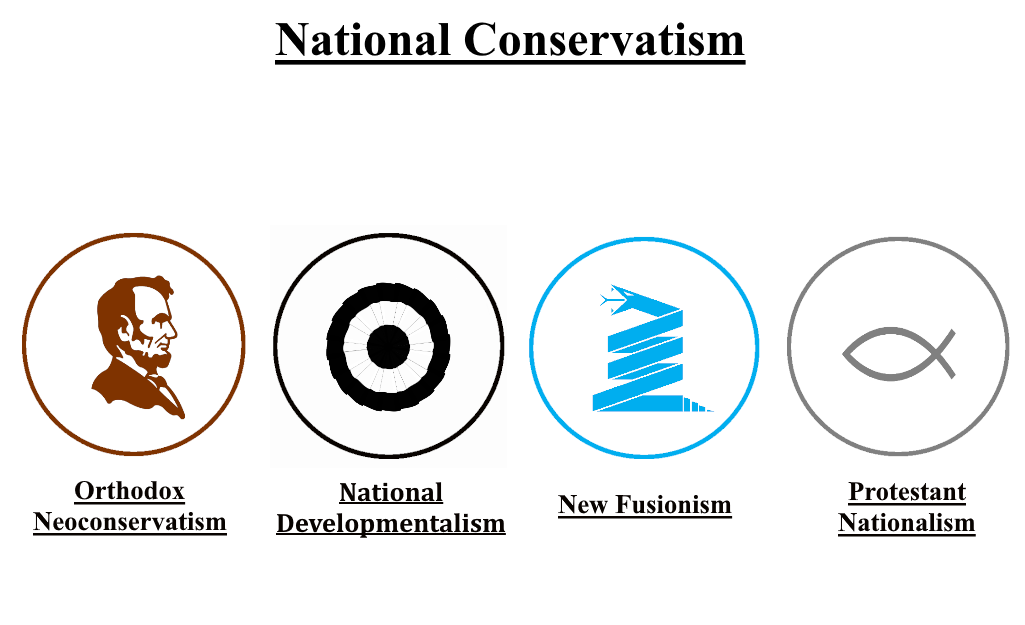Factions of the Rightosphere - National Conservatives
The four factions of the fledging 'National Conservative' movement.
Of all the groupings of the ‘Third New Right’, it is the ‘National Conservatives’ (NatCons) that have gotten by far the most mainstream-conservative backing.
The Heritage Foundation, once firmly subscribing to the Reaganite paradigm, has been fully on board with National Conservatism since Kevin Roberts became its president. The think-tank’s flagship endeavour, Project 2025, very much follows NatCon ideology.
On the other hand, the National Conservatives are the most actively condemned faction by the liberal media, who use the label as a catch-all term to describe the breadth of opinion that is the ‘Third New Right’.
The National Conservative Statement of Principles was signed by numerous groups. To quickly summarise these principles, NatCons believe:
The nation is supreme, over and above concepts like ‘universal human rights’, and international institutions claiming to protect these by interfering in national domestic affairs.
Mass immigration and demographic displacement are existential crises for the long-term survival of Western nations, and this process should be immediately halted.
The traditional national religion and the traditional family should be openly supported by the state, and an impossible standard of neutrality should be abandoned.
Hungarian Prime Minister Viktor Orban is a hero of the entire NatCon grouping. If one wants to find out what they believe in more detail, or just have a great reading list, this grouping is unique for having a central homepage, which you can find at ‘nationalconservatism.org’.
In this article I will discuss four factions of the National Conservatism grouping which I have categorised myself: Orthodox Neoconservatives, National Developmentalists, New Fusionists, and Protestant Christian Nationalists.
Orthodox Neoconservatives
This faction is centred around the Claremont Institute, and the numerous other entities in their orbit (American Mind, IM1776, Claremont Review of Books). As you can probably tell from the logo, they are specific to America.
Claremonters, who refer to themselves as ‘West Coast Straussians’, would heavily object to being called ‘Orthodox Neoconservatives’, given that the Neoconservative movement is said to have originated from left-wing anti-communist hawks and high-ranking employees of the managerial state.
However, the reason why I call them ‘Orthodox Neoconservatives’ is because of their subscription to the philosophy and historiography of Leo Strauss, albeit taking a very different message from his work than most Neoconservatives at present, and not sharing the same fanatical hawkishness on foreign affairs.
The important similarity with mainstream Neoconservativism is that the Claremonters, founded by students of the scholar Harry V. Jaffa (who himself was a student of Strauss), believe that America was founded as a ‘propositional nation’, detached from its Anglo-Saxon inheritance. Abraham Lincoln is a hero to the Claremonters, as they see him as having fulfilled the promise of the Declaration of Independence which the Founders were unable to follow through on, that being that ‘all men are created equal’.
Straussians reject historicism, the idea of contextually judging attitudes and ideas in their historical place, in favour of a fundamentalist view of ‘natural rights’. In light of this, the Claremonters passionately hate the Confederacy and Southern Traditionalism, which sharply distinguishes them from the Paleoconservatives, despite their alignment in terms of modern policy.
Harry V. Jaffa mostly supported the Civil Rights Movement, seeing Jim Crow as a betrayal of Lincoln’s reaffirmation of the principles of the Declaration. However, he and modern Claremonters like Christopher Caldwell, whilst condemning Jim Crow, also criticise the 1964 Civil Rights Act, specifically Title II and Title VII, for being the law which created a ‘second constitution’ (1). They do not see anything wrong with a strong federal government, but believe that those two articles of the 1964 Civil Rights Act went beyond the mandate of the 14th Amendment, and in fact betrayed it.
The Claremont Institute sees the modern United States, and the Woke domination of its institutions, as an attack on its founding ideals. This led to them becoming the first intellectual backers of Trump; Michael Anton’s 2016 essay ‘The Flight 93 Election’ has gotten much liberal media attention as an insight into the Claremonter perspective on the current historical period.
The reason I have categorised the Claremonters with the National Conservatives, and not as part of a separate group like many others have done, is that the Claremonters see the American constitution and the Declaration of Independence as the ‘American National Conservative tradition’ (competing with Paleoconservative claims to that label). They also hold (comparatively to America today) socially conservative positions, and support Donald Trump’s stated project to ‘save America’.
Representatives of ‘Orthodox Neoconservatism’ include Chris Rufo, Michael Anton, Victor Davis Hanson, John Eastman, Scott Yenor, Inez Stepman, Charles R. Kesler, and Christopher Caldwell. Publications include the Claremont Institute main website, Claremont Review of Books, American Mind, and IM1776. Some notable books include Christopher Caldwell’s ‘The Age of Entitlement’.
National Developmentalists
This faction can also be termed ‘Neo-Hamiltonian’ in the case of the United States, due to its support for a strong, interventionist federal government.
National Developmentalists advocate industrial policy, high tariffs, immigration restriction, and a collective bargaining system for trade unions. They embrace the use of the federal government to accomplish economic policy objectives, very similar to the Catholic New Dealers.
However, they are distinct from the Catholic New Dealers in that they see the culture war as a distraction, and as a war that can never be won whilst one continues to focus on it.
The key figure in this faction is Michael Lind. Lind sees the political orientation of Abraham Lincoln, Theodore Roosevelt, and Franklin Roosevelt, particularly Theodore’s ‘New Nationalism’, as the trajectory America should follow, rejecting neoliberalism and globalisation from a right-wing Hamiltonian perspective.
Other American members of this faction include Oren Cass and his think-tank ‘American Compass’. This think-tank desires to give more of an intellectual basis to Trumpism, and make it an ideological movement beyond just the personality of Donald Trump. Propagating its ideas is the magazine ‘American Affairs’, edited by Julius Krein, which is very focused on developing American manufacturing against China.
This faction has broad appeal. It is definitely the most ‘respectable’ of the NatCon factions, getting positive press coverage due to its left-leaning economics and lack of focus on the culture war. It is close to policymakers in Washington D.C, with National Developmentalists often pushing for bipartisan co-operation on infrastructure and industry bills, and having supported much of Joe Biden’s economic agenda.
Crucially, the National Developmentalist faction has influenced Trump himself, with him more explicitly advocating for high tariffs in his 2024 campaign.
Time will tell whether they have a lasting influence.
New Fusionists
This is a very diverse group. Basically, the belief of this tendency is that the combination of economic neoliberalism with social conservatism (Fusionism) is not inherently contradictory, but rather complimentary.
They reject the narrative of the ‘Catholic New Dealers’, who suggest Fusionism only benefitted libertarians. New Fusionists instead argue Woke was able to become so dominant because Fusionism was not actually tried.
According to this narrative, whilst conservatives promised to shrink the size of government, they completely failed to do so. This allowed Wokeness to retain and grow its taxpayer funding and government imposed mandates on businesses and individuals.
New Fusionists see the ‘managerial class’ that James Burnham talked about, consisting of educational professionals, upper and middle managers, HR administrators, and much of the white-collar sector, as the key group spreading Wokeism, not capitalists. To them it is the university system that creates both a Woke accreditation cartel, as well as the manufactured perception of Woke being popular. This in turn leads to corporations trying to appeal to young graduates on the basis of manufactured statistics of youth support for Wokeness, which become self-reinforcing.
Even if they aren’t hardcore neoliberals themselves, New Fusionists recognise the importance of getting a section of the elite on one’s side. For the wealthy to become anti-Woke, the anti-Woke need to give them a convincing economic offer that will enhance their profits and power.
Kevin Roberts, the current leader of the Heritage Foundation, is a New Fusionist, as is Heritage generally. Having taken the helm of a think-tank still subscribing to Reaganism, he has been a bridge builder between big-money conservative donors and the National Conservative movement, being in large part responsible for the development of Project 2025 and its heavy NatCon bent.
In Britain, there are some on the right-wing of the Tory Party that would fit this label, such as Suella Braverman. Other British New Fusionists include the Substack
, , and the commentator Poppy Coburn.To conclude, whilst this is a diverse faction in many respects, they are united by their support for free-market economics, fiscal conservatism, and deregulation, combined with much tougher immigration restrictions and anti-Wokeism.
Protestant Nationalists
The final faction that comes under the banner of ‘National Conservatism’, who are America-specific, are what I term the ‘Protestant Nationalists’. This group is often just referred to as ‘Christian Nationalist’ by the liberal media, in an exclusively pejorative fashion.
Protestant Nationalists believe that America should be oriented around Christian principles, with the pre-1960s cultural paradigm restored. They want pornography banned, abortion banned in all circumstances, and the end to no-fault divorce.
They have a traditional American commitment to ‘states rights’ that the Postliberal ‘High Integralists’ do not. Alongside this comes a large suspicion of the managerial state, desiring a more localist, Jeffersonian means of economic organisation, supported by the social security the church historically provided.
There is considerable overlap of this group with Paleoconservatism and White Identitarianism. Stephen Wolfe’s 2022 book ‘The Case for Christian Nationalism’ is an example of this connection.
‘American Reformer’ is the key publication of this faction. Additionally, the YouTuber ‘Redeemed Zoomer’, who talks about Christianity through Minecraft, is involved in an interesting project called ‘Operation Reconquista’ to get conservatives to take back control of the Mainline Protestant Churches.
I would say the Protestant Nationalists are ‘Third New Right’ and not ‘Dissident Right’ because they still operate within mainstream conservative circles, and do not completely reject the idea of electoral democracy. Their more ‘nationalist’ brand of Christianity makes them National Conservative rather than Postliberal.
Some individuals that represent this tendency include Stephen Wolfe, Doug Wilson, Nate Fischer, Ben C. Dunson, Bradford Littlejohn, Timon Klein, and Redeemed Zoomer.
Conclusion
All of these factions are united by broadly subscribing to the doctrine of ‘National Conservatism’, even though they differ on what that means precisely.
They place emphasis on the nation state and its demographic survival, being very much ‘conservative’ in the sense of not wanting uncontrollable cultural change through immigration.
They also all believe that the nation state should be sovereign over and above international institutions claiming ‘universal rights’ (or non-American conceptions of these rights in the case of the Orthodox Neocons) as they view conceptions of morality as nation and religion-dependent, even if they personally believe their religion is true.
Thank you for reading and please subscribe.
Bibliography
Caldwell, C. (2020). The Age of Entitlement: America since the sixties. Simon & Schuster.
Lind, M. (1995). Next American Nation: The New Nationalism and the Fourth American Revolution. Simon & Schuster.
Lind, M. (2012). Land of Promise: An Economic History of the United States. Harpers.
Click here for the next entry, on the Paleos and Techno-Optimists.









Someone sent me this. Interesting take. I will continue reading this year.
I should point out that I am not a nationalist, Christian or otherwise, as I see nationalism a concept that doesn't resonate in America. I said this directly in my NatCon 3 address, as well as explicitly rejecting Christian nationalism. See:
https://www.aaronrenn.com/p/christian-nationalism
https://americanmind.org/features/what-is-christian-nationalism/nationalism-isnt-american/
Of these groups, my policy preferences are actually towards the neo-Hamiltonian view (I've written for American Affairs multiple times). Though I am Protestant and believe it is undeniable that America is a historically and culturally Protestant country.
Excellent series. Much-needed. Can't wait for the next installment.